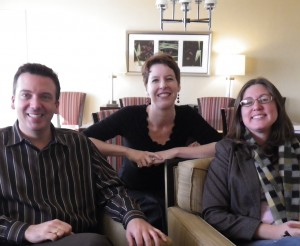Music Therapy in Hospice and Palliative Care
Three music therapists with experience in different aspects of hospice and palliative care gathered around the AMTA-Pro microphone to talk about the state-of-the-art of music therapy in this growing field. After each music therapist took time to describe their clinical work, the group members – Lauren DiMaio, Russell Hilliard, and Natalie Wlodarczyk – had a lively conversation about the exciting possibilities for expansion of music therapy in hospice and about the complex ethical dilemmas that often arise in care for people of all ages dealing with a wide variety of end-of-life issues. Each therapist also told heartwarming stories about music as therapy, touching patients, families, and staff in meaningful ways as individuals approach the end of life.
[display_podcast]
— + —
Music Therapy in Hospice and Palliative Care
AMTA-Pro Podcast
March, 2012
AMTA-Pro Podcast Speaker Information
Lauren DiMaio MMT, MT-BC
Lauren DiMaio received her bachelor’s degree in music therapy from Berklee College of Music and her Master’s Degree from Temple University, where she is currently pursuing her PhD. She is the Bereavement Manager and Music Therapy Internship Director at CarePartner’s Hospice in Ashville, NC. Lauren completed her music therapy internship 12 years ago at CarePartner’s Hospice with Jim Jenkins, the founder of the hospice music therapy program in 1994. She is the chair of the Music Therapy Association of North Carolina’s task force for licensure in North Carolina. Lauren said, “Dying and grief is a life long passion, so I am grateful for the opportunity every day to share music therapy with my clients, witness my amazing staff, and watch my inspiring music therapy interns.”
Lauren has presented numerous times both nationally and locally on topics including Ethical Dilemmas in End of Life Music Therapy, Improvisation and Hospice, End of Life Assessment and Music Therapy, and Appraoches for Alzheimer’s Patients at End of Life.
Lauren’s publications include the following:
Patrick, L & Avins, K. (2004) Music therapy approaches for
patients with dementia at end of life. In C. Dileo & J. Lowey (eds.).
Music therapy at the end of life (pp.77-84). Cherry Hill, NJ: Jeffrey
Books
DiMaio, L. (2010). Music Therapy Endtrainment: A Hunmanistic Music
Therapist’s Perspective of Using Music Therapy Entrainment with
Hospice Clients Experiencing Pain. Music Therapy Perspectives, 28(2),
106-115.
When asked about resources she recommends for music therapists interested in hospice and palliative care, Lauren replied, “I recommend every end of life music therapist read Chava Sekeles’ Music Therapy: Death and Grief, Dileo and Lowey’s End of Life Music Therapy as well as Colin Lee’s Music at the Edge.” Lauren also recommended that music therapists continue in their training in all aspects of music and therapy. She commented, for example, “The voice is, in my opinion, the most important instrument in hospice…never stop improving and expanding your vocal skills!” Lauren also said, “I make mistakes and try to learn from them. I try to have integrity in my work. At the end of the day, still, after 9 years of this work, death is a mystery to me. Let’s all go Deep into the Mystery.”
Russell Hilliard, PhD, LCSW, LCAT, MT-BC
Russell is the National Director of Supportive Care at Seasons Hospice and Palliative Care based out of Chicago, IL. He is also the Founder of the Centers for Music Therapy in End of Life Care. Russell’s research, advocacy, and consultation have resulted in the development of first-time music therapy programs in hospices throughout the nation, thereby creating many new music therapy positions. He is the author of the text, Hospice and Palliative Care Music Therapy: A Guide to Program Development and Clinical Care, and his research has been published in a wide variety of scholarly journals. He also wrote a chapter titled, Music and Grief Work with Children and Adolescents, in a book titled Creative Interventions with Traumatized Children, edited by Cathy A. Malchiodi. Dr. Hilliard has provided keynote addresses for healthcare conferences and is a frequent presenter at professional conferences world-wide.
Natalie Wlodarczyk, PhD, MT-BC
Natalie is Assistant Professor of Music Therapy at Drury University after being a Graduate Assistant at Florida State University from 2007 to 2010. She was the Music Therapy Coordinator and Internship Director at Big Bend Hospice in Tallahassee, FL from 2005 to 2007. The title of her master’s thesis was “The Effect of Music Therapy on the Spirituality of Persons in an Inpatient Hospice Unit as Measured by Self-Report,” and her doctoral dissertation was “The Effect of a Single-Session Music Therapy Group Intervention for Grief Resolution on the Disenfranchised Grief of Hospice Workers.” Natalie is a volunteer bereavement counselor and director of Drury University’s Intergenerational Rock Ensemble. She has presented at conferences and published articles and book chapters related to a variety of topics, including hospice and end-of-life issues.
Natalie’s publications include the following:
Belgrave, M., Darrow, A. A., Walworth, D., & Wlodarczyk, N. (2011). Music therapy and geriatric populations: A handbook for practicing music therapists and healthcare professionals. Silver Spring, MD: American Music Therapy Association.
Wlodarczyk, N. (2011). The effect of a single-session music therapy group intervention for grief resolution on the disenfranchised grief of hospice workers. Manuscript submitted for publication.
Wlodarczyk, N. (2010). The effect of audio and video modeling on beginning guitar students’ ability to accurately sing and accompany a familiar melody on guitar by ear. Journal of Music Therapy, 47(2), 180 – 189.
Wlodarczyk, N. (2009). The use of music and poetry in life review with hospice patients. Journal of Poetry Therapy, 22(3), 133 – 139.
Wlodarczyk, N. (2007). The effect of music therapy on the spirituality of persons in an in-patient hospice unit as measured by self-report. Journal of Music Therapy, 44(2), 113 – 122.
Wlodarczyk, N. Stylistic singing and playing: Making your adult repertoire sound more authentic. Manuscript in progress.
